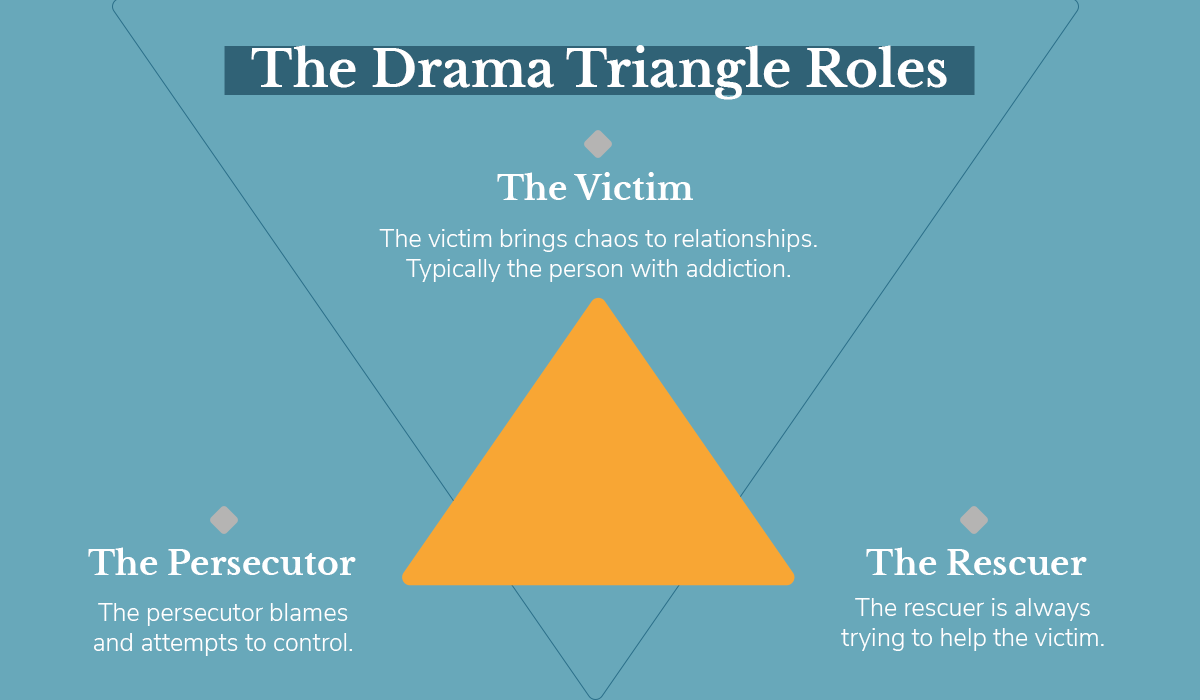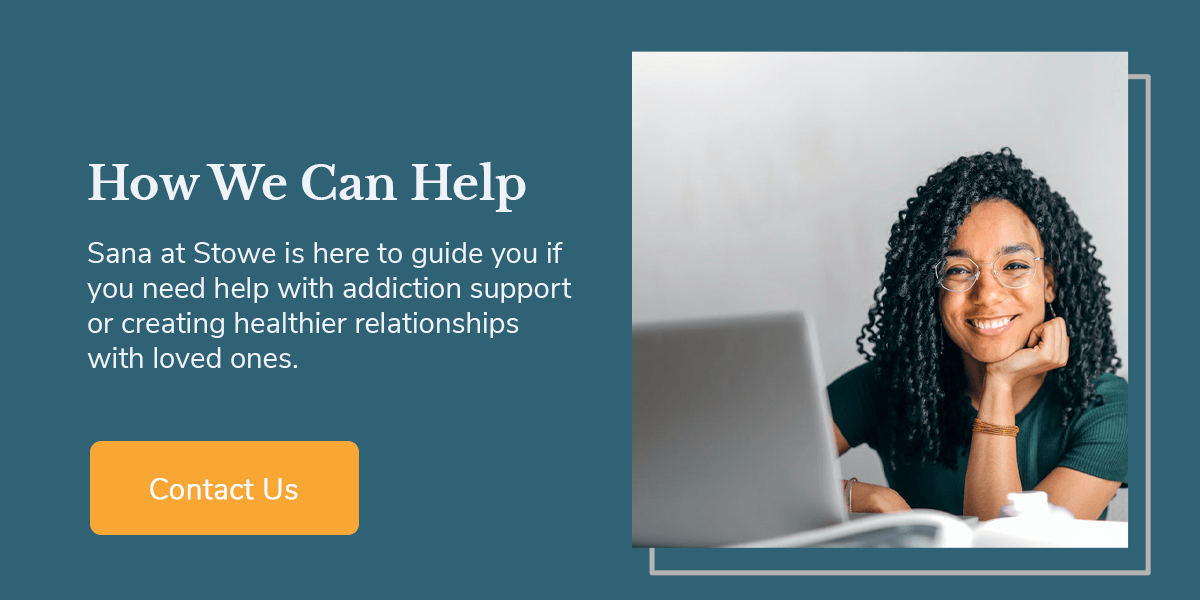Addiction is a complex condition that can significantly impact relationships. If you love someone with addiction, whether it’s your parent, spouse, or friend, you understand how challenging that relationship can be. You would give anything to help them heal and recover, yet your relationship is fraught with challenges, sorrow, resentment, and anger.
It can be overwhelming to know whether you are doing what’s best for them and yourself. Understand that you are not alone and that this experience is a reality for many people. This guide will explain the Karpman Drama Triangle and how it relates to relationships when addiction is involved. With time, you can learn how to set healthier boundaries with your loved one and heal from the effects of addiction.
What Is the Drama Triangle?
Psychologist Stephen B. Karpman introduced the Drama Triangle in 1968 to describe people’s roles in dysfunctional relationships. Since then, the triangle method has been used to understand all types of relationships, from coworkers and friendships to family members and romantic relationships. The Drama Triangles in relationships consist of three roles — victim, rescuer, and persecutor.
Each person in an unhealthy relationship, such as one with someone with addiction, assumes these roles. While you will likely stick to a specific one for some time, you might take on a different one, depending on the situation. You might perceive the other person’s role differently while recognizing these roles do not accurately represent your thoughts or beliefs. Instead, the roles describe how you respond to specific circumstances the relationship puts you in.
The Drama Triangle Roles
The drama triangle roles represent human responses to a difficult situation that has created or worsened a toxic relationship or one constantly in conflict. While you might not recognize your role in the drama triangle, you can change how you engage in the relationship at any time.

Here’s a breakdown of the drama triangle roles explained:
The Victim
The victim is the person in the relationship who does not take responsibility for their part in creating the situation — typically the person with addiction. They are dealing with a condition they cannot stop on their own, which can make them feel as if life is out of their control.
They need professional help but must admit they have a problem and commit to recovery. If they are already in recovery, they must continue working toward sobriety, which can be challenging for them. They might even relapse, which can create new conflict in a relationship.
The victim brings chaos to relationships. Over time, the victim will put their loved ones in different corners of the triangle — rescuers and persecutors — pitting the people who are trying to help against one another.
To establish a more functional relationship with the victim, you must recognize these chaotic patterns and be able to respond effectively. The only way for the victim to change their role is to take responsibility for their choices and actions. They may need addiction and mental health support to make this happen.
The Rescuer
The rescuer is always trying to help the victim. They typically assume the role of the enabler in a relationship involving addiction. They are compulsive about helping or rescuing the victim from the consequences of their behaviors and actions. They might even feel valued only when others need them, even if it is an unhealthy need.
The rescuer often provides the victim with monetary resources, even while knowing they could be supporting the addiction. They will do anything they can to feel like they’re helping the victim heal. To remove yourself from the rescuer role in the drama triangle, focus on your well-being first. Avoid putting others’ needs before your own, and consider reaching out for help from mental health professionals.
The Persecutor
The persecutor blames and attempts to control. They feel anger toward those in the other roles, seeing them as unwilling to take responsibility for their actions. They also see others as reluctant to admit they are causing any issues and wonder how they could have ended up in a relationship like this.
Like the other roles, persecutors are sad, hurt, and conflicted, but they display it through anger and attempts to control the situation. They want the victim to take responsibility and fix the problem while feeling like the rescuer is just as responsible since they enable it. The persecutor doesn’t see their “tough love” attitude as a stressor in the relationship.
To break from this role, you must admit your need for control stems from anger and hurt about the relationship and disappointment that it isn’t what you expected. You must accept the reality of the situation, accept that it cannot be perfect, and determine acceptable boundaries for you. This may require help from mental health professionals.
Living in the Drama Triangle
Any time the rescuer and persecutor engage with the victim, it has the potential to create conflict. So, now that you understand your role and know the current way isn’t working, what should you do? Here are some methods of coping with the unhealthy dynamic of the drama triangle:
- Create self-awareness: By educating yourself and creating self-awareness, you can be aware of your current role and be watchful not to take on any of the three roles. To improve your self-awareness, ask how long you’ve been playing the role, how it is serving you, and what actions you can take to escape it.
- Determine your boundaries: It’s essential to determine your boundaries in the relationship and clearly state what you are willing or unwilling to do.
- Communicate with empathy: When discussing your boundaries, communicate with compassion and honesty instead of implying wrongness to each other. This creates an opportunity to share your feelings, establish a deeper connection, and understand the needs and requests of all other parties.
- Take action: The next step is to take action and implement your desired changes. Just note that making sustainable changes can take time, as you step out of your comfort zone for the first time.
To implement healthy changes, you might need professional mental health support. You might attend individual therapy or join a support group, where you can relate to others with similar challenges and offer and receive support, encouragement, and ideas to and from others.
How We Can Help
After understanding the drama triangle and the role you might be playing in your relationship, you can start taking steps toward healthy change. Over time, difficult discussions will become easier once you establish boundaries and adopt more empathetic language. Once you’ve agreed upon these changes, Sana at Stowe is here to guide you if you need help with addiction support or creating healthier relationships with loved ones.
Sana is Here to Help
Sana is here for you and your loved ones. Sana at Stowe provides high-quality treatment for those struggling with substance abuse, alcohol addiction, trauma, and PTSD. Our compassionate and professional staff is dedicated to giving our patients the recovery experience they deserve in a safe and healing environment. To learn more or to get started on your journey to recovery today, give us a call or visit our contact form.
Click here to call us: 866-575-9958




